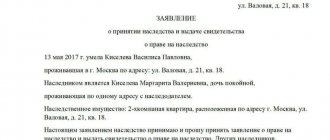Every person at a certain stage of his life is faced with the loss of people close to him and they leave behind property. Registration of inheritance for a house and land after the death of parents has its own distinctive features.
This is due to the fact that in the legal relationship under consideration there are two subjects - a capital structure and the site on which it is located. For each of them, you will need to provide the notary with a separate package of documents.
The article will explain all the subtleties and nuances of inheriting country buildings. Recommendations for an accelerated solution to this issue are presented.
What should an heir know when registering a house after the death of his parents?
Let us define the basic concepts that are encountered when initiating the process under consideration.
The inheritance of a deceased person (mother, father) is all real and movable property that belonged to him during his lifetime.
Real estate is apartments, land, buildings.
Everything else - money, vehicles, securities, products of intellectual or copyright work belong to the second group.
In accordance with Art. 1111 of the Civil Code of the Russian Federation, inheritance is accepted in two versions:
- in law;
- on the basis of a will.
Therefore, the inheritance of the house after the death of the mother in accordance with Art. 1152 of the Civil Code of the Russian Federation is adopted both on both grounds simultaneously, and on any of them separately.
The first thing you need to do is obtain a certificate from the registry office confirming the death of a parent and only then declare your rights to the property.
Transfer of a land plot from a deceased citizen to his heirs on the basis of Art. 1118 of the Civil Code of the Russian Federation, occurs, as in the case of home ownership, on general principles, without restrictions or additional permits.
Within six months after the death of their parents, children are required to present their rights to their property (Article 1154 of the Civil Code of the Russian Federation).
Unwanted objects
Not far from the place of potential purchase there may be not only lakes or pine forests, but also landfills, factories and other undesirable objects.
Dangerous objects. The list is incomplete, but it’s difficult to talk about everyone in the article. Here's what you need to pay attention to:
- Incinerators: Extremely toxic dioxins are found even at a distance of up to 25 km. Four such plants are being built in the Moscow region and one in Tatarstan.
- Municipal solid waste (MSW) landfills - both existing and reclaimed. Distance - up to 2-6 km, depending on the volume of burial and the wind rose.
- Waste sorting complexes without a landfill - up to 1 km.
- Settling ponds for sewerage structures - up to 5 km.
- Poultry farms, cattle farms, pig farms - up to 5 km, especially with open storage and drying of manure.
- Military training grounds, airfields - at least 15 km from the edge of the runways in their extension.
- Hazardous industrial enterprises - up to 10-15 km.
As a hint, what harmful and dangerous objects to pay attention to, you can focus on But it is possible that there will be no airfield nearby, but noise will be created by the children's playground next door, low-altitude flights of the Swifts and Vityazi air groups in Kubinka near Moscow, the highway motocross or the All-Russian Cheese Festival, which attracts 300 thousand visitors over three days.
Aerodromes. Relevant for the Moscow region. According to media reports, if sanitary standards for aircraft noise are observed, 800 thousand residents will need to be resettled. Naturally, this will not happen. But to prevent noise from airplanes from disturbing you, it is better to consider objects no closer than 30 km from airfields.
In order for the noise to be moderate, the distance from wide-body aircraft such as Boeing, Airbus, Sukhoi Superjet-100, Tu-154 to the house in a straight line at each point of the aircraft’s trajectory must be at least 1. 5 km. You can determine the distance using the service for monitoring aircraft movements in real time.
The distance is calculated using the formula:
L = √[√[((W1 − W2) × 111)² + ((D1 − D2) cos D1 × 111)²] + H²],
where: L is the distance to the aircraft in a straight line at the time of observation in kilometers; Ш1, Ш2 is the latitude of the aircraft and the land plot in question in degrees; D1, D2 is the longitude of the aircraft and the land plot in question in degrees; Н is the altitude of the aircraft at the time of observation in kilometers (1 foot = 0.3048 m).
What are the ways to inherit a house and land?
There must be a legal basis for this. Current legislation defines the following methods: contact a notary and write a statement or by filing a claim in court.
The optimal solution to the issue would, of course, be the first option. In the second case, contacting the competent authority is usually necessary when there are disputes between heirs and the six-month period has been missed.
Another way of registering property, through the court, occurs when the property is actually accepted. But we'll talk about this a little later.
Legally
The entire process is initiated on the basis of blood ties to the deceased. All relatives are divided into 8 groups.
The first stage, which has an advantage over the rest, includes:
- surviving spouse;
- children;
- parents.
It is they who, after the death of the mother, along with the living father, will be called upon to inherit in the first place (Article 1141 of the Civil Code of the Russian Federation).
All other groups of citizens who are more distantly related cannot, in such a situation, claim the property of the deceased if her children or grandchildren are alive.
If there are two children, for example, a son and a daughter, then all the property of the deceased parent is divided between them in equal shares.
In case of disputes, the law allows for the possibility of negotiations on this issue.
Legal successors can distribute the inheritance among themselves by concluding a written agreement, which is certified by a notary office.
If there is a will
In the text of this document, one of the parents can designate the circle of heirs among whom his property will be divided.
By law, a father or mother can designate in a will only personal property received after the death of relatives, as a gift, or acquired before the start of family life. This also includes half of the property acquired jointly during marriage (Article 256 of the Civil Code of the Russian Federation).
An important aspect of making a will is its validity - it must be certified and properly executed.
Parents usually do not make wills for their children unless there are other heirs or persons who can lay claim to their property.
This usually happens when other relatives live in the household. Or the parents remarried and do not want the property to go to their second spouse.
In accordance with the document, the property will be divided between the citizens designated in it in the shares determined by the deceased father or mother. Unless specifically described in the text of the will, the building and land will continue in equal shares among the assignees.
Let us pay attention to an important nuance: when inheriting by law and will, it is necessary to take into account the rights of the so-called obligatory heirs, if they exist.
This category includes:
- Dependents who have been in care for at least a year.
- Disabled spouse and parents.
- Minors and disabled children.
In accordance with Art. 1149 of the Civil Code of the Russian Federation, these persons have the right to claim 50% of the share that was due by law. Therefore, regardless of what is stated in the will, if there are “mandatory heirs,” then the children will share the mother’s property with them.
Actual acceptance and trial
This concept means the actual ownership and management of the parent’s property after his death (Article 1153 of the Civil Code of the Russian Federation).
This means that the inheritance of the house after the death of the father passes to the children who lived in the same living space with him on the basis of certain actions that they took.
Such actions include:
- security and repair of housing construction;
- payment of utilities and current payments for the house and land;
- voluntary payment of debts and loans.
If a mother or father dies, then the children, as first-degree heirs, actually take ownership of the building and land where they lived with them.
However, citizens will not be able to dispose of this property: sell, exchange, donate until they re-register the property with the registration authorities.
With this option, you will need to go to a notary to obtain a certificate of inheritance. Or you can file a lawsuit in court, which will make a decision allowing you to inherit this property. This document actually legally replaces a notarial certificate.
What about taxes?
Donors do not pay tax, because... when donating, they do not receive any income. Everything is simple here - no income, no tax.
According to clause 18.1 of Art. 217 of the Tax Code of the Russian Federation, the donee is exempt from paying personal income tax if the property was received as a gift from a close relative. A close relative is a spouse, parent, grandparent, son, daughter, brother and sisters (even with one common parent), and grandchild.
If received as a gift not from a close relative, personal income tax is withheld from the donee in the amount of 13% of the cadastral value of the donated real estate or share in it - clause 1 of Art. 224 of the Tax Code of the Russian Federation and clause 6 of Art. 214.10 Tax Code of the Russian Federation. For non-residents of the Russian Federation, the rate is 30% percent (clause 3 of Article 224 of the Tax Code of the Russian Federation). For minor recipients, personal income tax is paid by their parents (guardian/trustee) - clause 2 of Art. 27 of the Tax Code of the Russian Federation.
For example, the cadastral value of a house is 1.5 million rubles, the cadastral value of a plot is 500 thousand rubles. Total cadastral value 1.5 million + 500 thousand = 2 million rubles. The recipient did not receive the property as a gift from close relatives. This means that personal income tax is withheld from him in the amount of 13% * 2 million = 260 thousand rubles.
The tax return must be submitted by April 30 of the following year after registration of the transaction, and the tax must be paid by July 15 of the following year. Failure to pay personal income tax will result in fines and penalties, even if no notifications were sent from the tax office.
For example, a house and land were donated in 2021. This means that the donee must submit a declaration by April 30, 2022, and pay personal income tax by July 15, 2022.
Cost and timing of the procedure
Registration of land with house construction by contacting a notary can take a long time.
If you turn to a professional lawyer for help, he will carry out the entire procedure as quickly as possible, taking into account his experience and connections in various authorities.
If this issue is resolved through the court, the situation may drag on and range from 2 to 6 months. Therefore, it is better to choose the first method.
When performing the described procedure, children will incur certain expenses - it will be necessary to pay a state fee to a notary for issuing a certificate of inheritance.
For first-degree relatives (children) you will need to pay 0.3% of the value of the inherited estate, but not more than 100 thousand rubles.
There is an additional small fee for technical work. The amount of this payment is set independently by a specific official in each city or town.
Prices in Moscow and St. Petersburg will be higher than in other regions. If we indicate the cost of the services of a professional lawyer who will formalize everything through the appropriate authorities, then his remuneration can range from 8 to 10 thousand rubles.
How much does a house deed cost?
The cost of the gift is made up of three components:
- Duty. It is obligatory to pay for it - without a receipt of payment, a Russian employee cannot register the transfer of ownership rights to the recipient.
- Notary services. The cost of a deed for a house from a notary is 7050 rubles. for work of a technical nature and 0.5% of the cadastral value of the share is a state duty.
- 13% tax. This payment is required if the donor and recipient are not close relatives. Close relatives are parents, children, spouse, grandparents, sisters, brothers.
For example: Bas was given two houses. One house was given to her by her brother; when drawing up the contract, the relatives did not contact the notary. Vasya paid 2,000 rubles and received the property. Bass's second home was given to him by his second cousin. According to the law, she is not considered a close relative, and Bas needs to pay tax. The cadastral value of the house is 1,500,000 rubles. Vasya paid 2,000 for registering property rights and 195,000 rubles as tax.
Procedure and instructions for registering an inheritance for a house and land
At first glance, it seems that this is a complex and costly procedure. A person will spend most of his energy collecting documents for the building and the land on which it is located.
The whole process consists of several stages, the first of which is contacting a notary. This is followed by the collection and provision of a number of mandatory certificates and certificates.
You need to be prepared for the fact that some of them will have to be obtained from the competent authorities after a certain amount of time has passed. It is important that they are drawn up correctly and reflect the real picture of the inherited property.
Equally important! Before you begin registering an inheritance for a house and land, you should understand under what conditions the land was given to the deceased relative. It could be listed on it as private property, or as a lease with different periods of use and ownership.
Action 1. Contact a notary
It occurs at the place of registration of the deceased parent or where most of his property is located.
If the children are in another city, it is possible to send your application by mail to the locality where the inheritance case is opened, having previously notarized it (Article 1153 of the Civil Code of the Russian Federation).
You will need to provide a list of general mandatory documents indicating the right of inheritance.
These include:
- parent's death certificate;
- ID of the deceased;
- the applicant's civil passport;
- documents indicating relationship with the deceased;
- a will, if available, or a certified copy thereof.
Then you need to write a statement of title to the house and land in your own hand. In addition, you will need to pay 300 rubles. From this moment the inheritance case is opened.
Over a period of six months, a search is carried out for all legal successors and the amount of acquired property that belonged to the deceased parent is established. If the notary knows exactly this information, the certificate of inheritance can be issued within 6 months.
Action 2. Collection of documents
First of all, it is necessary to establish on what basis the land was transferred to the deceased. If it is from state ownership, you must obtain the appropriate certificate from the state archives.
If the process of land transfer took place on the basis of transactions, donation agreements, exchange, purchase and sale, a cadastral passport from the BTI will be required.
Required documents
| On house | To the ground |
| Registration certificate | Certificates of title |
| Certificate of estimated value from the BTI | Certificate of absence of encumbrances |
| A certificate stating that the object has not been seized or is not collateral. | Cadastral certificate of appraised value |
| Certificates of title | |
| Extract from the Unified State Register of Real Estate | A certificate stating that there are no debts to the state. |
| Certificate stating that there are no debts on utility bills |
Technical and title certificates are provided in originals, but it is recommended to attach copies of them.
It is possible that the notary may require additional documents to those listed above. This is only possible in specific cases.
Action 3. Obtain a certificate of inheritance for a house with land
First of all, the official carefully checks the authenticity of the entire package of submitted certificates, extracts, and passports.
Only after this can we talk about the onset of the final stage of the case, when a certificate of inheritance for the house and land plot by the legal successors of the deceased father or mother.
As mentioned above, this happens after six months or, in exceptional cases, earlier. Before handing it over, the notary will issue the account details where the state fee will need to be paid. Its size will depend on the estimated value of the site and the building.
Disabled people and combatants have benefits when paying fees. As soon as the certificate of inheritance is in hand, the final stage of the transfer of real estate and land to the new owner begins.
Action 4. Registration of ownership
This is a mandatory procedure that is regulated by law. It involves recording the transfer of ownership from a deceased person to his children. Without this step it is impossible to complete the entire process.
To implement it, you need to contact the Registration Chamber at your place of residence, where you write a corresponding application.
Along with it, you must provide:
- certificate obtained from a notary;
- title documents;
- receipt of payment of state duty;
- passport.
The authorized person in the Registration Chamber accepts this entire package and issues a receipt to the applicant, according to which he will receive an extract from the Unified State Register on the designated day. After its completion, the new owner has the right to fully dispose of the land and housing construction.
Is it necessary to exchange the old land certificate for a new one?
Replacement of old documents with new ones. Many dacha owners are faced with the need to register a previously arisen right, in other words, to re-issue an old-style land certificate. Previously, during the Soviet Union, all garden plots belonged to gardening partnerships or dacha cooperatives. In 1990, when the land code came into force, land began to be issued with a certificate of private ownership. We now call such a certificate an old-style land certificate. There are two types of them: small white (obtained before 1993) and large pink (obtained in 1993-1998). The issuance of such documents was not registered in the Unified State Register of Real Estate Rights.
What to do if you didn’t have time to contact a notary on time
Sometimes citizens miss the six-month deadline during which they must present their rights to the property of deceased relatives. Various reasons may contribute to this.
The law indicates that if the period for accepting the property of the deceased has expired, it can only be restored through a judicial procedure.
To do this, you will need to draw up a statement of claim and provide:
- Evidence indicating family ties with the deceased.
- Original will, if available.
- Written evidence indicating a missed deadline.
An important point in this matter will be the nature of the obstacles that prevented the son or daughter from arriving on time. They must have a valid motive, or due to force majeure.
Other circumstances are also taken into account:
- being on a long business trip abroad;
- serious illness;
- serving a sentence in penitentiary institutions;
- being under investigation in a pre-trial detention center.
Note! Heirs can go to court for another reason - if their rights are violated by a notary or third parties. This number includes scammers in the real estate market.
Re-registration of a plot of land, required list of documents
When it comes to re-registration of ownership of a land plot, two types of ownership are implied: lease and ownership . Legal knowledge and collection of a package of certified copies of documents during the re-registration process will be required. The application is written in free form, to which is attached an extract from the cadastral plan. As a rule, the authority gives a response after two weeks. If the citizen responded with consent, the applicant must be given a written permit to provide a free plot. In the case of a paid plot, the applicant receives a purchase and sale agreement. The citizen will register the land after payment.
How much does it cost
To understand how much it costs to redevelop a private property, you need to look at the price of each procedural point separately.
| Procedure | An object | Cost (in rubles) |
| Sketch approval | A private house | Up to 20,000 |
| Coordination of internal redevelopment features | Up to 60,000 | |
| Coordination of the process affecting load-bearing elements | Up to 65,000 | |
| Reconstruction | Glazing the facade or creating new doorways | Up to 105,000 |
| Combining rooms | A private house | Up to 100,000 |
| Creating a redevelopment project | Up to 30,000 | |
| Floor design | Floors | Up to 8,000 |
| Design of openings in the ceiling | Doors | Up to 60,000 |
| Inspection of load-bearing elements | A private house | From 30 000 |
Legislative regulation
The main laws that regulate the redevelopment of a private house are:
- Articles 25 to 29 of the Housing Code of the Russian Federation, which regulates legal and illegal actions for redevelopment and reconstruction of the interior of a house;
- Government Decree No. 266 of the Russian Federation contains the form of the document and application for redevelopment and regulates the coordination of work with administrative authorities;
- Article 7.12 of the Code of Administrative Offenses dictates the responsibility of the owner who decides to carry out redevelopment without permission from the authorities.
- In addition, at the regional level there may be additional legislation regulating such actions in residential premises.
What actions need to be recorded?
Regarding a private house, the following series of actions are considered redevelopment:
- Laying gas, water and electricity supply systems, and changing their location;
- Re-equipment and creation of additional bathrooms and bathrooms;
- Installation of showers, Jacuzzis and other plumbing fixtures, as well as equipment of technical rooms that require greater water and electricity consumption;
- Re-equipment of ventilation and installation of additional ventilation equipment;
- Creating doorways;
- Construction of additional residential premises and extensions;
- Moving and dismantling partitions.
This set of actions needs permission to prevent actions from being performed that fall into another list containing a series of actions for which you will not receive permission. The law prohibits the following work:
- Repair and re-equipment of premises that can worsen the living conditions of your neighbors or cohabitants;
- Installation of heating devices on balconies and loggias;
- Installation of balconies above the second floor, if this was not intended by the original design;
- Carrying out work in an emergency building;
- Increased load on the load-bearing walls of the house;
- Creation of an internal additional room without windows and heating systems;
- Interfering with the room ventilation system;
- Dismantling load-bearing walls, weakening the strength of the structure.
If your desire to refurbish your home is not on this list, do not rush into action. First, you should prepare the documents and, after receiving permission, carry out the redevelopment of a private house.
Read about the cost of remodeling an apartment here.
Re-registration procedure
The procedure for re-registration of a house is fixed in:
- Civil Code of the Russian Federation.
- Federal Law No. 218 of July 13, 2015 “On state registration of real estate.”
- Federal Law of December 30, 2009 No. 384-FZ “Technical Regulations on the Safety of Buildings and Structures.”
- Federal Law No. 4462-1 of February 11, 1993 “Fundamentals of the legislation of the Russian Federation on notaries.”
- Federal Law of July 24, 2007 No. 221-FZ “On the State Real Estate Cadastre”.
This procedure includes:
- preparation of documents;
- drafting documents for transfer of ownership;
- carrying out a transaction with a house;
- preparation of documents for filing an application for registration;
- checking the set of papers and making a decision on the possibility of registration;
- entering changed information into the database;
- issuance of a confirmation document.







